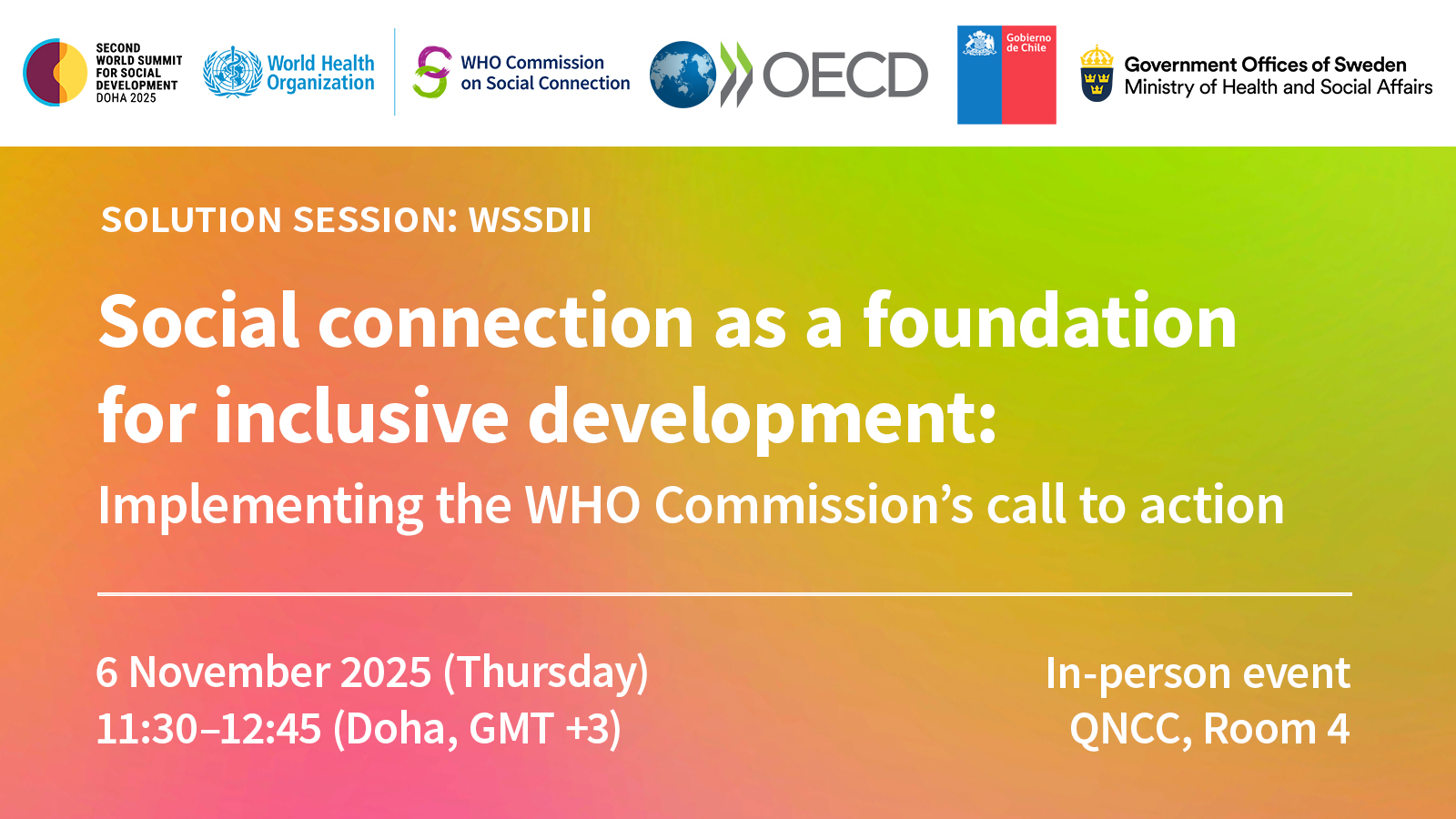The WHO Commission on Social Connection's flagship report — From loneliness to social connection: charting a path to healthier societies — launched in June 2025, presents compelling evidence that social connection is a fundamental determinant of health, well-being, and inclusive social and economic development. Social disconnection, manifesting as loneliness and social isolation, is highly prevalent, with loneliness affecting 1 in 6 people globally, with higher rates in younger people and in low- and middle-income countries. It undermines societal cohesion, deepens inequality, and harms physical and mental health, contributing to 871,000 early deaths annually.
Complementing these findings, the OECD report Social Connections and Loneliness in OECD Countries, released just before the WSSDII in October 2025, highlights changing patterns of social interaction. People are meeting in person less often while remote contact has increased, though the well-being effects of this shift remain mixed. Notably, men and young people, previously seen as lower risk are emerging as increasingly vulnerable to poor social connection.
Together, these reports underscore how social disconnection often goes hand in hand with socio-economic disadvantage, limiting educational attainment, economic progress, and societal stability.
Yet, promising solutions exist. By integrating social connection into social development strategies, we can strengthen cohesion, support intergenerational solidarity, and foster environments that promote meaningful social interaction. Strong relationships are the foundation of healthy communities, resilient economies, and stable societies.
A landmark 2025 World Health Assembly resolution reinforces the urgency of this agenda, calling on governments, non-state actors, and WHO and other United Nations entities to take coordinated, multisectoral action. As the world accelerates progress toward the 2030 Agenda, embedding social connection into national development policies is not optional—it is essential.
Objective
This interactive session will spotlight how governments, communities, and stakeholders can translate the Commission’s recommendations into practical, scalable actions aligned with the WSSDII themes and priorities such as social integration, poverty eradication, quality employment, universal health coverage and digital inclusion.
Solution Session Goals
- Demonstrate how social disconnection compounds poverty, inequality, and social exclusion.
- Explore opportunities and risks of digital technologies in impacting and addressing social disconnection with a focus on youth.
- Share country and community-level examples of integrating social connection into labour market policies, social policy, urban planning and health systems.
- Reinforce the WHO Commission’s call to action and invite commitments to support implementation and further research.
Format & Speakers
This 60-minute, in-person session will open with connection conversations, allowing peers to meet, exchange and reflect together based on key prompts linked to the WSSDII themes.
- Dr Tedros Adhanom Ghebreyesus, WHO Director-General (by video)
- H.E. Ambassador Claudia Fuentes Julio, Permanent Representative of Chile to the United Nations and other International Organizations in Geneva
- H.E. Ambassador Gautam S. Bhattacharyya, Ambassador of the Kingdom of Sweden to the State of Qatar
- Dr Laura Kestilä, Associate Professor (Demography) and Head of Team Socially Sustainable Society, Finnish Institute for Health and Welfare (THL)
- Alana Officer, Unit Head, Social Determinants, Urban Health, Health Promotion, and Behavioural Insights, World Health Organization
- Lara Fleischer, Head of the Well-being Data Insights and Policy Practice Team, OECD WISE Centre
- Dr Ola Abualghaib, Director, Global Disability Fund Secretariat
- Ms Palakh Khanna, Founder – Break the Ice, Asia Regional Representative – Commonwealth Students' Association
- Ms Nataya Branjerdporn, Orygen Global, Manager of Programmes and Partnerships; WHO Youth Council representative
The session will also feature short video vignettes of lived experience — from youth, older persons, people with disabilities, and migrants — adding depth and diversity to the perspectives in the room.
Please note that regrettably, online participation is not possible.
Expected Outcomes
- Raise visibility of the WHO Commission and OECD reports and WHA resolution on social connection
- Advance the case for social connection as a measurable social development priority
- Foster interest in cross-sector partnerships or technical working groups

